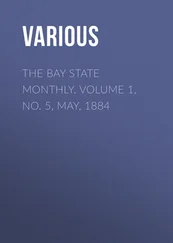Various - The Bay State Monthly, Volume 3, No. 4
Здесь есть возможность читать онлайн «Various - The Bay State Monthly, Volume 3, No. 4» — ознакомительный отрывок электронной книги совершенно бесплатно, а после прочтения отрывка купить полную версию. В некоторых случаях можно слушать аудио, скачать через торрент в формате fb2 и присутствует краткое содержание. Жанр: foreign_antique, periodic, foreign_edu, на английском языке. Описание произведения, (предисловие) а так же отзывы посетителей доступны на портале библиотеки ЛибКат.
- Название:The Bay State Monthly, Volume 3, No. 4
- Автор:
- Жанр:
- Год:неизвестен
- ISBN:нет данных
- Рейтинг книги:5 / 5. Голосов: 1
-
Избранное:Добавить в избранное
- Отзывы:
-
Ваша оценка:
- 100
- 1
- 2
- 3
- 4
- 5
The Bay State Monthly, Volume 3, No. 4: краткое содержание, описание и аннотация
Предлагаем к чтению аннотацию, описание, краткое содержание или предисловие (зависит от того, что написал сам автор книги «The Bay State Monthly, Volume 3, No. 4»). Если вы не нашли необходимую информацию о книге — напишите в комментариях, мы постараемся отыскать её.
The Bay State Monthly, Volume 3, No. 4 — читать онлайн ознакомительный отрывок
Ниже представлен текст книги, разбитый по страницам. Система сохранения места последней прочитанной страницы, позволяет с удобством читать онлайн бесплатно книгу «The Bay State Monthly, Volume 3, No. 4», без необходимости каждый раз заново искать на чём Вы остановились. Поставьте закладку, и сможете в любой момент перейти на страницу, на которой закончили чтение.
Интервал:
Закладка:
The morning of November 7th decided the result of the national election. From this time onward everything was adroitly managed to swell the revolutionary furor. The people of South Carolina, and especially of Charleston, indulged in a continuous holiday, amid unflagging excitement, and, while singing the Marseillaise, prepared for war! Everybody appeared to be satisfied,—the conspirators, because their schemes were progressing, and the people, because, innocently duped, they hoped for success.
The first half of the month of December had worn away. A new governor, Francis W. Pickens, ruled the destinies of South Carolina. A Convention, authorized by the Legislature, met at Columbia, the capital of the State, and, on the 20th of December, passed unanimously what it called an ordinance of secession, in the following words:—
We, the people of the State of South Carolina, in convention assembled, do declare and ordain, and it is hereby declared and ordained, that the ordinance adopted by us in convention on the 23d day of May, in the year of our Lord 1788, whereby the Constitution of the United States of America was ratified, and also all Acts and parts of Acts of the General Assembly of this State ratifying amendments of the said Constitution, are hereby repealed; and that the Union now subsisting between South Carolina and other States, under the name of the United States of America, is hereby dissolved.
The ordinance was immediately made known by huge placards, issued from the Charleston printing-offices, and by the firing of guns, the ringing of bells, and other jubilations. The same evening South Carolina was proclaimed an "independent commonwealth." Said one of the chief actors: "The secession of South Carolina is not an event of a day. It is not anything produced by Mr. Lincoln's election, or by the non-execution of the Fugitive-Slave Law. It is a matter which has been gathering head for thirty years." This was a distinct affirmation, which is corroborated by other and abundant testimony, that the revolt was not only against right, but that it was utterly without cause.
The events which took place in South Carolina were, in substance, duplicated in her sister States of the South. Mississippi seceded on January 9, 1861; Florida, on January 10; Alabama, on January 11; Georgia, on January 18; Louisiana, on January 26; and Texas, on February 1; but not a single State, except Texas, dared to submit its ordinance of secession to a direct vote of the people.
One of the most striking features in the early history of the secession is the apparent delusion in the minds of the leaders that secession could not result in war. Even after the firing upon Sumter, the delusion continued to exist. Misled, perhaps, by the opinion of ex-President Pierce, 1 1 "If, through the madness of Northern abolitionists, that dire calamity (disruption of the Union) must come, the fighting will not be along Mason and Dixon's line merely. It will be within our own borders, in our own streets , between the two classes of citizens to whom I have referred. Those who defy law, and scout constitutional obligation, will, if we ever reach the arbitrament of arms, find occupation enough at home."— Letter to Jefferson Davis, dated January 6, 1860.
the South believed that the North would be divided; that it would not fight. It is but fair to say that the tone of a portion of the Northern press, and the speeches of some of the Northern Democrats, and the ambiguous way of speaking on the part of some of the Northern Republicans rather warranted than discouraged such an opinion.
There was, however, one prominent man from Massachusetts, who had united with the Southern leaders in the support of Breckenridge, who had wisdom as well as wit, and who now sought to dispel this false idea. In the month of December he was in Washington, and he asked his old associates what it meant.
"It means," said they, "separation, and a Southern Confederacy. We will have our independence, and establish a Southern government, with no discordant elements."
"Are you prepared for war?" inquired Butler.
"Oh! there will be no war; the North will not fight."
"The North will fight. The North will send the last man and expend the last dollar to maintain the government."
"But," said his Southern friends, "the North can't fight; we have too many allies there."
"You have friends," said Butler, "in the North, who will stand by you so long as you fight your battles in the Union; but the moment you fire on the flag the Northern people will be a unit against you. And you may be assured, if war comes, slavery ends ."
Butler was far too sagacious a man not to perceive that war was inevitable, and too sturdy and patriotic not to resist it. With a boldness and frankness which have shown themselves through his whole political career, he went to Buchanan; he advised and begged him to arrest the commissioners, with whom he was then parleying, and to have them tried for treason! Such advice it was as characteristic of Benjamin F. Butler to give as it was of President Buchanan to disregard.
But the adoption of secession ordinances and the assumption of independent authority was not enough for the Cotton Republic. Though they hoped to evade civil war, still they never forgot for a moment that a conflict was not only possible, but even probable. Their prudence told them that they ought to prepare for such an emergency by at once taking possession of all the arms and military forts within their borders.
At this time there was a large navy-yard at Pensacola, Florida; from twelve to fifteen harbor forts along the Atlantic and Gulf coasts; half-a-dozen arsenals, stocked with an aggregate of one hundred and fifty thousand arms (transferred there about a year before from Northern arsenals, by Secretary Floyd); three mints; four important custom-houses; three revenue cutters, on duty at leading Southern seaports, and a vast amount of valuable miscellaneous property,—all of which had been purchased with the money of the Federal Government.
The land on which the navy-yards, arsenals, forts, and, indeed, all the buildings so purchased and controlled, stood, was vested in the United States, not alone by the right of eminent domain, but also by formal legislative deeds of cession from the States themselves, wherein they were located. The self-constituted governments of these State now assumed either that the right of eminent domain reverted to them, or that it had always belonged to them; and that they were perfectly justified in taking absolute possession, "holding themselves responsible in money damages to be settled by negotiation." The Federal Government and the sentiment of the North regarded this hypothesis false and absurd.
In due season the governors of the Cotton States, by official orders to their extemporized militia companies, took forcible possession of all the property belonging to the Federal Government lying within the borders of these States. This proceeding was no other than levying actual war against the United States . There was as yet no bloodshed, however, and for this reason: the regular army of the United States amounted then to but little over seventeen thousand men, and, most of these being on the Western frontier, there was only a small garrison at each of the Southern forts; all that was necessary, therefore, was for a superior armed force—as a rule, State militia—to demand the surrender of these forts in the name of the State, and it would at once, though under protest, be complied with. There were three notable exceptions to this peaceable evacuation,—first, no attempt was made against Fort Taylor, at Key West; Fort Jefferson, on Tortugas Island; and Fort Pickens, at Pensacola, on account of the distance and danger; second, part of the troops in Texas were eventually refused the promised transit, and were captured; third, the forts in Charleston harbor underwent peculiar vicissitudes, which will be recounted later on.
Читать дальшеИнтервал:
Закладка:
Похожие книги на «The Bay State Monthly, Volume 3, No. 4»
Представляем Вашему вниманию похожие книги на «The Bay State Monthly, Volume 3, No. 4» списком для выбора. Мы отобрали схожую по названию и смыслу литературу в надежде предоставить читателям больше вариантов отыскать новые, интересные, ещё непрочитанные произведения.
Обсуждение, отзывы о книге «The Bay State Monthly, Volume 3, No. 4» и просто собственные мнения читателей. Оставьте ваши комментарии, напишите, что Вы думаете о произведении, его смысле или главных героях. Укажите что конкретно понравилось, а что нет, и почему Вы так считаете.












